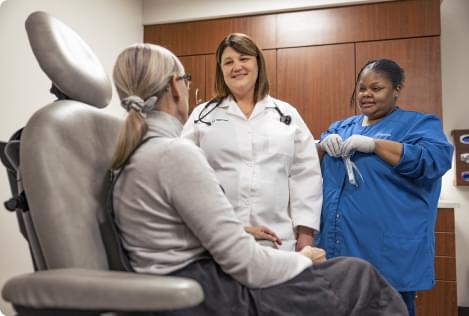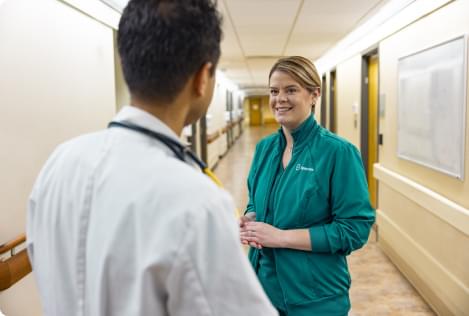Prevention and Control
Infection Prevention and Control is a practical, evidence-based approach that prevents patients and caregivers from being harmed by avoidable infections and antimicrobial resistance.
Infection prevention and control affects all aspects of healthcare and patient safety, including hand hygiene, healthcare-associated infections, antimicrobial resistance, and how hospitals operate during and outside emergencies.
Our patients’ safety and preventing infections is a major focus at UM Health-Sparrow. To ensure we meet our high standards, infection preventionists carefully evaluate our performance and are constantly improving the quality of care we provide. Our caregivers are dedicated to continually improving in this area.
All UM Health-Sparrow infection preventionists are certified in infection control and members of the Association for Professionals in Infection Control and Epidemiology (APIC). Infection preventionists work with lab leaders and Infectious Disease physicians to prevent the spread of infections caused by microorganisms. These specialists work together with your physician to provide the best care possible. See our Infectious Diseases page to learn more.
Hand Hygiene
Hand hygiene is the single most important method for preventing the spread of infection.
Proper handwashing is using hand sanitizer, or if hands are visibly soiled, soap and water, and washing for at least 20 seconds.
Patients and visitors should clean their hands:
- Before preparing or eating food
- Before touching eyes, nose, or mouth
- Before and after changing wound dressings or bandages
- After using the restroom
- After blowing nose, coughing, or sneezing
- After touching hospital surfaces such as bed rails, bedside tables, doorknobs, remote controls, or the phone
Caregivers are expected to do the same along with the World Health Organization’s 5 Moments for Hand Hygiene guidelines.
COVID-19 Testing and Vaccine
Most people with COVID-19 have mild symptoms, but some people can become severely ill. Within a few weeks of illness, most people with COVID-19 get better. Older people and those who have certain underlying medical conditions are more likely to get severely ill from COVID-19. According to the CDC, vaccines against COVID-19 are safe and effective.
To protect yourself and others wear a mask, stay six feet away from others, get vaccinated, avoid crowds, wash your hands, cover coughs/sneezes, clean and disinfect high-touch surfaces and monitor your health daily.
UM Health-Sparrow is committed to providing access to COVID-19 vaccines, and testing; for more information please refer to the respective linked pages.
Flu Shots
Influenza (flu) is a potentially serious disease that can lead to hospitalization. The best way to help protect against flu is to get an annual seasonal flu vaccine. A flu shot is recommended for anyone six months or older. Getting the vaccine not only protects you, but also protects those around you who may be more vulnerable to the virus, such as children and the elderly. For more information on the flu, please see our flu page.
Antimicrobial Resistance
Antibiotic resistance happens when germs like bacteria and fungi develop the ability to defeat the drugs designed to kill them. That means the germs are not killed and continue to grow. Therefore, infections such as MRSA and C. difficile caused by antibiotic-resistant germs are sometimes difficult to treat.
UM Health-Sparrow takes antimicrobial resistance seriously and has implemented the CDC Antibiotic Stewardship Program to address this growing concern. See our Antimicrobial Stewardship Program page to learn more.
One way you can help prevent resistance is by taking antibiotic medications only when prescribed and exactly as directed.
Frequently Asked Questions (FAQs)
Hand sanitizer is the preferred method for cleaning your hands when they are not visibly soiled because it’s more effective, easier to use, and is less drying and irritating than soap and water
- Clean your hands
- Take medications as directed
- Ask about safe injection practices
- If you have a catheter, ask everyday if you still need it
- If your room looks dirty, ask to have it cleaned
- Cover your sneeze and cough
- If you’re having surgery, ask if you should shower with germ-killing soap ahead of time
HAIs are a result of germs entering your body during medical care.
Examples include:
- Catheter-associated urinary tract infections – When germs travel along a urinary catheter and cause an infection in your bladder or kidney
- Bloodstream infections – When germs enter the blood by way of a catheter or tube that is placed in your vein
- Surgical site infections – An infection that happens after surgery in the part of the body where the surgery took place
- (Ventilator-Associated) Pneumonia – Infection of the air sacs in one or both of the lungs
No. According to the CDC, you should not get a COVID-19 vaccine and a flu vaccine at the same time. COVID-19 vaccines should be given alone with at least 14 days either before or after you get any other vaccines, including a flu vaccine. This is because there is currently limited information on the safety and effectiveness of getting other vaccines at the same time as a COVID-19 vaccine.
As more information becomes available, this recommendation may change. Your healthcare provider can help you decide the best vaccination schedule for you and your family.


